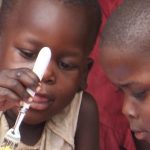Transforming whole food systems for nutrition requires wide-reaching alliances of stakeholders from multiple sectors. Recognizing this, DFID funded Transform Nutrition (TN), a large consortium led by IFPRI that is producing research on nutrition-specific and nutrition-sensitive interventions (such as agriculture, social protection, and women’s empowerment) in specific regions around the world. The TN consortium, a six-year >> Read more
UK (Department for International Development)
A longstanding partner to IFPRI, the United Kingdom’s Department for International Development (DFID) is the largest bilateral donor to development-focused research. As such, DFID fosters the new technologies and ideas that are essential to tackling some of our greatest challenges. In June 2002, the International Development Act made poverty reduction the official focus of DFID’s work, and the department has risen to meet the challenge. DFID’s support has contributed to IFPRI’s work tackling root causes of hunger, particularly in Africa. It emphasizes improving agricultural productivity and innovation, promoting climate change resiliency, and ensuring food and nutrition security through cash transfers, biofortification, and other means. In 2010, IFPRI’s collaborated with DFID’s Foresight Food and Farming study that produced innovative evidence on the increasing pressure on the global food system.
Recently at IFPRI’s 40th Anniversary event, Tim Wheeler, Deputy Chief Scientific Adviser for DFID shared how IFPRI’s evidence-based research has impacted the agency and its work towards food and nutrition security. He said, “IFPRI has been at the forefront of many aspects of development…successful in elevating debates to high-level policymakers transforming development packages.”
For more on the projects that IFPRI and DFID partnered together, please go to this brochure.
Innovations in Index Insurance: Weathering the Storm
With support from DFID and other donors beginning in 2010, IFPRI assessed how to improve the potential of index insurance to enhance the resilience of smallholder farmers. Risk is part of everyday life for many of the world’s poorest households, and uninsured risks can pose considerable costs to current and future welfare. Thus, the lack >> Read more
Championing Evidence-Based Agricultural Policy: Committing to agriculture investments through CAADP
In 2003, DFID and other funders requested IFPRI’s involvement in supporting the Comprehensive Africa Agriculture Development Programme (CAADP) agenda of scaling up agriculture investments. The 2014 Malabo Declaration outlines seven commitments for advancing CAADP and transforming Africa’s agricultural growth and development. In the declaration, African leaders recommitted to the principles and values of CAADP, including >> Read more
Ethiopian Strategy Support Program: Country-led, country-driven development
The overall goal of IFPRI’s Country Strategy Support Program (CSSP) is to promote greater progress toward sustainable and pro-poor growth in developing countries by improving the design and implementation of development strategies. One of these successful efforts is the Ethiopia Strategy Support Program (ESSP), launched in 2004 with support from DFID and other donors. ESSP >> Read more
Increasing Strategic Agricultural Public Spending in Nigeria: Transforming the sector
With the support of DFID, IFPRI has for many years been at the forefront of measuring how public expenditures affect agricultural productivity and rural poverty. The strategic allocation of public expenditures in agriculture is crucial to ensuring food and nutrition security, and poverty reduction. In Nigeria, increasing agricultural productivity promises positive impacts on the poor, >> Read more
Preschool Nutrition in Guatemala and Zimbabwe: Lifelong benefits
DFID’s support of IFPRI has enabled researchers to produce landmark work confirming that early nutrition matters for development later in life. Specifically, IFPRI’s research has shown that investing in preschool nutrition has long-term positive health and economic impacts—and that failing to invest can wreak long-term damage. In 2006, IFPRI determined that undernourished preschoolers in Zimbabwe >> Read more
- 1
- 2
- 3
- …
- 5
- Next Page »





